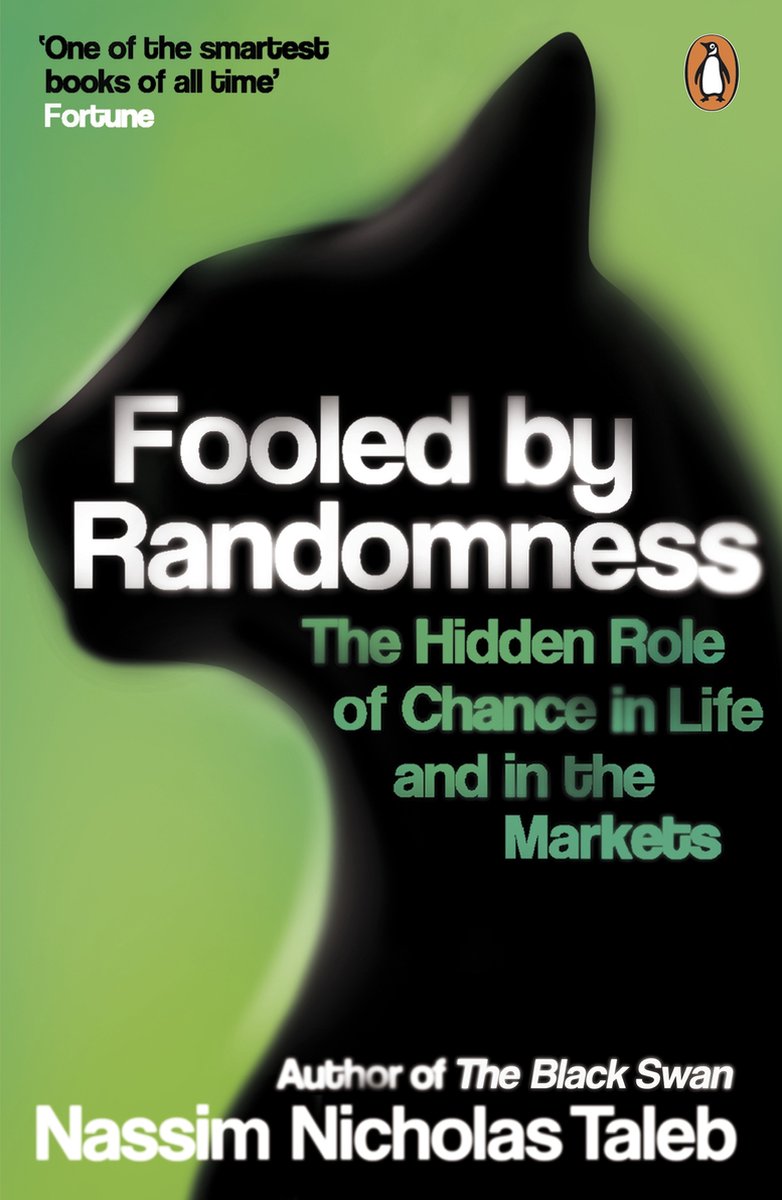
Fooled by Randomness by Nassim Taleb
Living life based on the notions of probability. Sounds like it goes against human nature doesn’t it? That is how Nassim Taleb describes the lucky fools, or how one can detect the lucky fool. In his book “Fooled by Randomness”, Taleb explains how “theory” differs from “reality”, how “volatility” differs from “return”, and how “noise” does not prove a “signal”.
🖊️ Nassim Taleb is a Lebanese-American essayist, mathematical statistician, former option trader, and risk analyst. His work mainly concerns problems of randomness, probability, complexity, and uncertainty.
My 🔑 takeaways:
To be confident in a world full of randomness, one must be pretty certain that they were right because they “were right”, not because of some lucky coincidence. If you ask any successful trader what their strategy is, they will always come up with some genius answer. Never will they admit that they were simply “lucky”. So how do we determine whether it was luck, or skill? Also when selecting a portfolio manager, one will always find a manager that consistently outperformed the market. But if the sample size is large enough, and we have a survivorship bias, is it really skill?

What makes the book stand out is that Taleb considers the notions of probability in every path in life. Once you start viewing life in this way, many things may not be as they seem. For example, Taleb writes: “Arguably, in expectation, a dentist is considerably richer than the rock musician who is driven in a pink Rolls Royce, the speculator who bids up the price of impressionist paintings, or the entrepreneur who collects private jets. For one cannot consider a profession without taking into account the average of the people who enter it, not the sample of those who have succeeded in it.”
He mentions “alternative histories” — a concept of judging performance by the cost of the alternative. Instead of only looking at the results (e.g. war, politics, medicine, investments), one takes into account all possible paths. This eliminates survivorship bias and luck, making it more accurate to determine the probability of the outcome and whether it was skill.
Taleb specifically mentions that randomness should not be mistaken for “equiprobable”, as some outcomes may be more likely than others. In finance this is very relevant: based on volatility one can assign probabilities to the price path of an asset with a certain degree of confidence. However, in the short term, all one often sees is noise. Taleb states: “Over a short time increment, one observes the variability of the portfolio, not the returns.” and “Our emotions are not designed to understand the point.”

Taleb also explains that looking at probability is not enough — it is the expected value that matters. He uses this example:
“Assume I engage in a gambling strategy that has 999 chances in 1,000 of making $1 (event A) and 1 chance in 1,000 of losing $10,000 (event B).”

The expected value is a loss of close to $9, showing frequency is irrelevant without considering magnitude.
Taleb warns that during financial crises, the magnitude and likelihood of extreme events are severely underestimated. As he writes: “History teaches us that things that never happened before do happen.”
Another example: “I have just completed a thorough statistical examination of the life of President Bush. For 5 years, close to 16,000 observations, he did not die once. I can hence pronounce him as immortal, with a high degree of statistical significance.”
Thus, in markets, just because something never happened before doesn’t mean it won’t. Black Swan events are always around the corner.
💭 “No amount of observations of white swans can allow the inference that all swans are white, but the observation of a single Black Swan is sufficient to refute that conclusion.”. - John Stuart Mill
Final Word
Taleb’s view is summarized in his own words:
“I am frequently asked the question: when is it truly not luck? To be honest, I am unable to answer it. I can tell that person A seems less lucky than person B, but the confidence in such knowledge can be so weak as to be meaningless. I prefer to remain a skeptic. People frequently misinterpret my opinion. I never said that every rich man is an idiot and every unsuccessful person unlucky, only that in absence of much additional information I prefer to reserve my judgment. It is safer.”
Thus, due to the random nature of many events, one must always keep in mind the confidence intervals and magnitude of events. If one does not, there is very little one can do in the event of a Black Swan.

